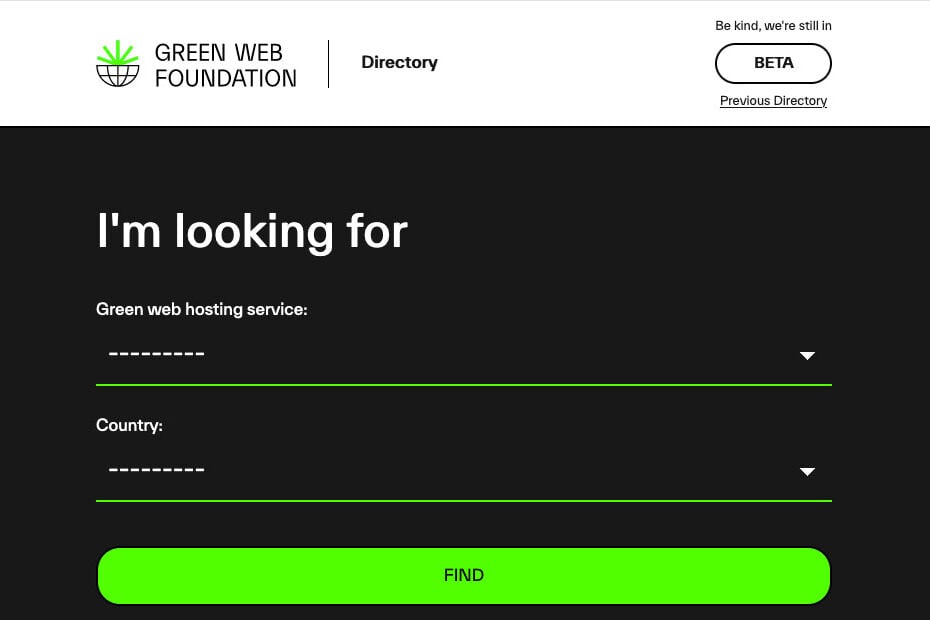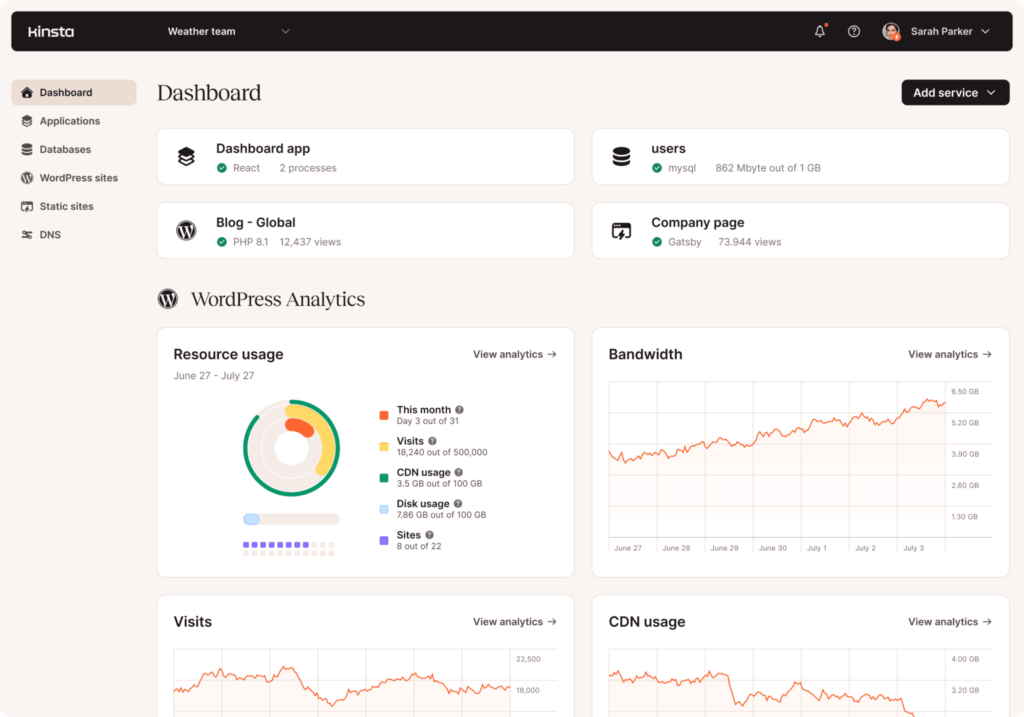Green Hosting from Mightybytes
Here’s how Mightybytes provides our clients with secure, fast, reliable green hosting that helps them more effectively meet business goals.
Where you host your data matters. Increasingly, an organization’s data serves as a market differentiator, a time- and cost-saver, and a potentially extensive source for innovation opportunities. Plus, data production is often the inevitable output of your digital products and services, such as websites or mobile apps. It’s important to manage data responsibly.
High-performance, low-impact hosting is key to successful data governance. To maximize chances for continued success, it’s also important to make educated decisions about the partners you choose.
Greening Your Digital Infrastructure
What’s more, powering web hosting and other digital infrastructure with renewable energy helps improve your organization’s environmental impact:
- Digital products or services you create and own could be potential sources for Scope 1 or 2 emissions.
- Those you subscribe to or purchase from third-parties generate Scope 3 emissions.
Coupled with other responsible digital strategies, powering your web hosting with renewable energy can help mitigate the long-term effects of climate change. This is a key part of any sustainable data strategy.
W3C Guidance on Hosting Sustainability
The World Wide Web Consortium’s Web Sustainability Guidelines (WSGs) offer clear guidance on finding a more sustainable hosting provider. The WSGs offer five success criteria on this topic to consider:
- Monitor metrics: Does the provider monitor and share important environmental metrics, such as energy use, water use, Power Usage Effectiveness (PUE), and others?
- Equipment longevity: Does the provider have a publicly available policy covering how they extend the life cycle of hardware they use?
- Recycling waste: Does the provide recover, recycle, and upcycle waste?
- Renewable electricity: Does the provider purchase energy from sources with the lowest possible carbon intensity?
- Remaining emissions: Does the provider compensate or otherwise offset emissions that it can’t reduce?
Unfortunately, not all hosting is created equal. Finding a mission-aligned green hosting partner that does some or all of the above while also offering reliability (uptime rates of 99% or more), good security, speedy data delivery, and prioritizes great support and customer service is no easy feat.
We learned this the hard way during a nearly fifteen year journey to find the perfect green hosting partner. Read on to discover our lessons learned, what we did to address them, and how we used these lessons to offer better green hosting options for client websites.

Our Long Road to Viable Green Hosting
For ten years, I’ve been seeking a hosting partner that can fulfill a trifecta of requirements for us: excellent customer service, high reliability, security and performance, with servers powered by renewable energy. We have yet to find that partner — and there is a real market opportunity for the right host.
— Andrew Boardman, Creative Director, Mangrove
As a Certified B Corp, it is important that Mightybytes provide ethical, responsible, and more sustainable digital products and services to our clients. Our website hosting, site support, and maintenance services help clients mitigate risk and reduce environmental impact while also meeting their visitors’ needs and organizational business goals. Secure, reliable green hosting from a trusted third-party partner plays an important role in this equation.
Since the early 2010s, Mightybytes researched many green hosting providers. Each claimed to offer the ‘greenest’ solutions available:
- Some planted trees.
- Others purchased RECs or carbon offsets.
- A select few used direct renewable energy sources like rooftop solar arrays or windmills to power their data centers.
Over the years, several became host vendors for Mightybytes-managed websites. By the mid-2020s, we had explored—and subsequently severed ties with—over a dozen green hosting partners.
Unfortunately, relationships with green web hosts often ended due to problems with site reliability, poor customer service, or, in one case, a partner hosting hate groups. As an LGBT-certified Business Enterprise, that’s a line we can’t cross.
Impactful green hosts must offer the complete package. Greenwashing risks aside, making sustainability claims while delivering crappy service, sloppy security, or worse, supporting fascism and bigotry undermines any company’s integrity. Conscientious companies won’t sacrifice quality just to say they’re using a greener partner. There’s too much risk involved.
With all this said, after an exhaustive and time-consuming partner search spanning well over a decade, here is where we’re currently at.
Migrating Our Green Hosting to Kinsta
We recently entered into our latest partnership with Kinsta, a globally distributed company started by developers in 2013 to improve performance and, in their own words, “create the best hosting platform in the world.”
Kinsta provides cloud-based hosting solutions for WordPress and other open source web applications. The company prioritizes speed, security, and performance, offering numerous features, including:
- A high-performance server network
- Built-in caching
- Cloudflare CDN integration
- 24/7/365 technical support
- Advanced developer tools

Kinsta’s scalable Agency Partner Program includes premium support, onboarding, and training. An easy to use account dashboard gives Mightybytes the tools we need to efficiently manage our clients’ hosting and data needs.
Plus, B Corp agency partners like Wholegrain Digital—who we collaborate with on the Sustainable Web Design site—also use Kinsta, a trusted vote of confidence in our book.
Kinsta’s Partnerships
Kinsta built their services atop Google Cloud Platform (GCP) and they regularly communicate Google’s green credentials in their own marketing. At one point, Google was the world’s largest corporate investor in renewable energy.
However, Google has quietly rolled back their carbon neutrality claims with emissions rising 50% since 2019 due to AI development. Unfortunately, this potentially undermines Kinsta’s green hosting claims.
Similarly, Kinsta also touts their relationship with Cloudflare as part of their green hosting solution as well. Cloudflare has impressive sustainability and social impact claims. It would be great to see Kinsta make similar commitments, which brings us to our next point…
Where Kinsta Has Room to Improve
It is a common misconception that digital sustainability just means focusing on performance. While performance and efficiency are certainly important, a more comprehensive and holistic approach to sustainability requires that organizations dig deeply into the social, environmental, and economic implications of their products, programs, policies, and practices.
Unfortunately, by focusing specifically on partners and performance, there’s room for Kinsta to improve and verify its claims in the name of telling a better sustainability story. However, we appreciate the company’s commitment to filling its supply chain with responsible partners.
With all this being said, in addition to the WSG criteria listed above, if Kinsta really wants to be the best hosting platform in the world, they should consider making sustainability commitments of their own:
- Add a formal statement or Code of Ethics to their website outlining company sustainability goals.
- Publish company impact reports illustrating their efforts and showcasing a focus on continuous improvement. Cloudflare has great examples to jumpstart this process.
- Join the W3C Sustainable Web Group to help us improve the Web Sustainability Guidelines (hint, hint).
- Better yet, join the Certified B Corp community.
Publicly adopting even some of the items above would solidify Kinsta’s commitment to more sustainable tech solutions and reduce greenwashing risk. It would also give values- and mission-aligned organizations the confidence needed to forge partnerships with Kinsta, especially since there are so many crappy providers out there.
You can read more details about Kinsta’s existing green claims in this post on their website. @Kinsta, if you need help with any of the bullets above, feel free to give us a shout. 🙂

Going Beyond Green Hosting
After an exhaustive search, we’re excited to offer fast, secure, reliable hosting for our clients’ websites and applications even if our partner has room to grow in their green commitments. However, hosting is only one component of a more comprehensive, systemic approach to web sustainability:
- Using sustainable web design practices, Mightybytes designs and builds more accessible, efficient, low-carbon digital products and services that align with the W3C Web Sustainability Guidelines mentioned above.
- Bundling hosting with twice-monthly, hands-on website maintenance helps Mightybytes and its clients improve security and reduce risk over time, making our clients’ websites more resilient.
- Monthly reporting and analysis using tools like Ecograder and others help our clients get on a path of continuous improvement.
- Finally, as part of our Net Zero commitment, at the end of each year Mightybytes also offsets trackable emissions we can’t otherwise reduce. This typically includes emissions generated by the processes we use to bring our client projects to life.
Companies that adopt these practices will also get ahead of the curve on pending regulatory guidance and legislation around these issues, some of which have already passed in the EU, Germany, France, and other countries.
Green the Web With Us!
For all the reasons mentioned and linked to above, it is more important than ever to reduce waste and transition to clean energy as quickly as possible. For those who manage and maintain digital products and services, green web hosting is an important piece of the sustainability puzzle.
We’re always expanding boundaries and pushing limits of the greener digital solutions we offer. For the most updated information, read the latest on our blog, review the services we offer, or contact us to ask specific questions.
Digital Carbon Ratings, now in Ecograder.
Understand how your website stacks up against industry carbon averages with this new feature.
Try Ecograder


